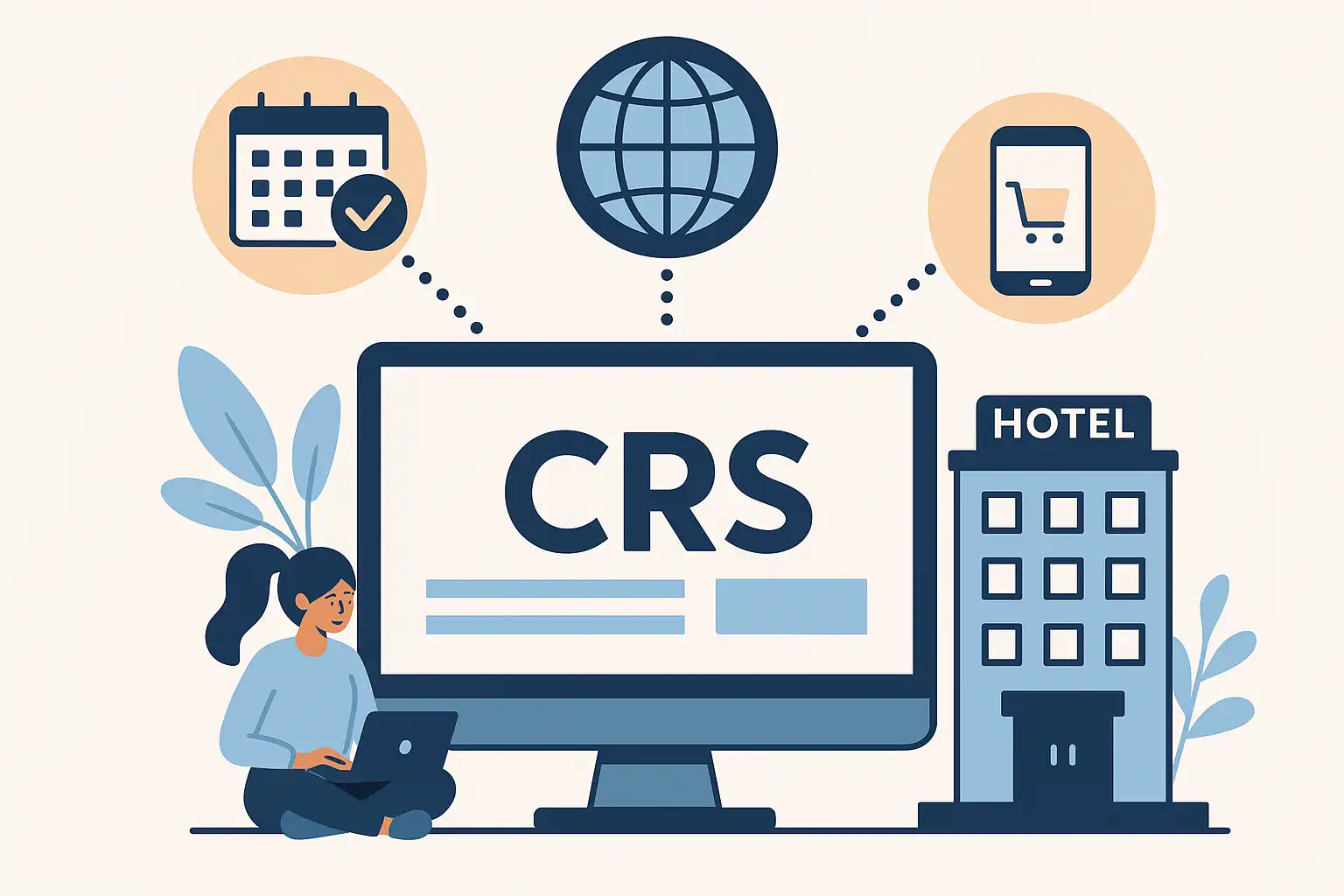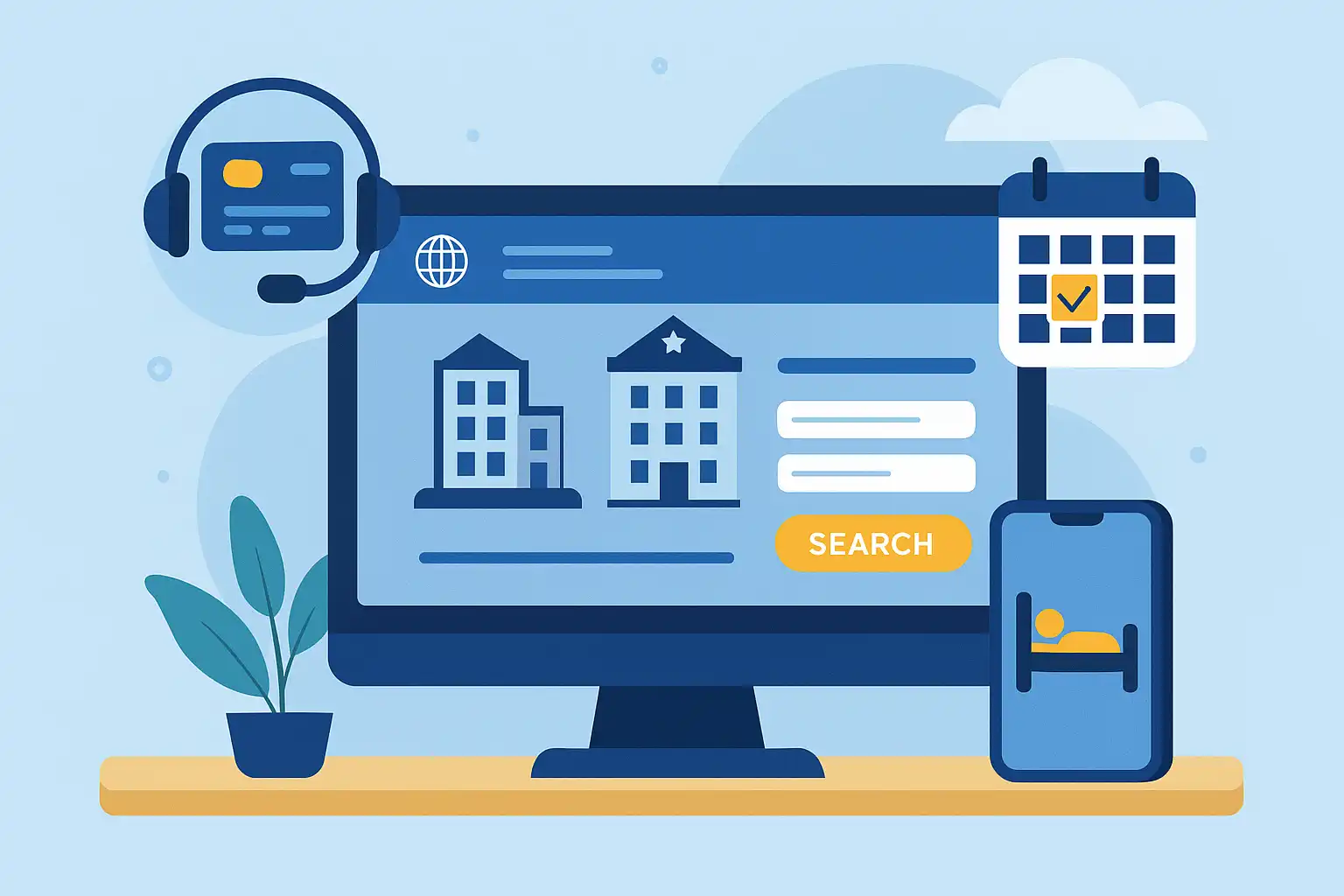Hotel CRS: Complete Guide to Central Reservation Systems for Hotels
 Mika Takahashi
Mika Takahashi Mika Takahashi
Mika TakahashiManaging hotel reservations across numerous distribution channels while keeping rates consistent can feel like juggling flaming torches. That’s where a hotel central reservation system (CRS) comes in—it acts as the command center connecting your property to the global travel marketplace, making booking management across all channels smooth and hassle-free.
In today’s cutthroat hotel industry, not having a reliable central reservation system means risking lost revenue due to overbooking mishaps, pricing inconsistencies, and time-consuming manual work. Whether you’re running a cozy independent hotel or overseeing a sprawling hotel chain, understanding how a hotel CRS works is key to boosting revenue and simplifying your operations.
This all-in-one guide covers everything you need to know about central reservation systems—from their core features to practical tips on implementation—so you can make smart decisions about this vital hotel technology.

Think of a hotel central reservation system as powerful reservation software that keeps your hotel inventory and rates up-to-date in real time across multiple distribution channels. It’s the central hub where all your booking data comes together, letting you manage reservations efficiently without the chaos.
At its heart, a hotel CRS pulls together data from your property management system, booking engine, online travel agencies, and global distribution systems. This single source of truth means that when a guest books a room through any channel, your inventory is instantly updated everywhere else.
But a CRS does more than just handle bookings. Modern platforms can juggle group reservations, corporate rates, and loyalty programs, all while keeping every system talking to each other seamlessly.
Gone are the days of clunky manual updates and limited integrations. Today’s cloud-based CRS solutions offer real-time synchronization, automated workflows, and in-depth analytics that help you make smarter business decisions.
A hotel central reservation system lets you optimize revenue by automatically adjusting rates based on demand, seasons, and competition—while keeping prices consistent across channels like Booking.com, Expedia, and your direct booking site.
With these smart pricing tools, you can roll out last-minute deals, special promotions, and packages that update everywhere instantly, helping you make the most of every booking opportunity.
A CRS can reduce manual booking mistakes and busywork by up to 30%, freeing your team to focus on delivering great guest experiences instead of drowning in paperwork.
Front desk staff love having all reservations in one easy-to-use system, cutting down training time and minimizing costly errors.
When your guest data flows effortlessly between systems, your team can offer personalized service that anticipates guest preferences and needs.
From booking to check-out, automated confirmations, pre-arrival messages, and follow-ups create a professional and welcoming experience that keeps guests coming back.
One of the biggest headaches for hotels is overbooking. A CRS prevents this by instantly updating room availability across all channels the moment a booking is made.
Whether it’s managing room upgrades, maintenance blocks, or group allocations, your CRS keeps every distribution channel perfectly in sync—letting you grow your reach without the risk.
With all your reservation data in one place, you get powerful insights into booking trends, channel performance, guest demographics, and revenue patterns.
This treasure trove of information lets you craft targeted marketing campaigns, tailor promotions, and boost direct bookings—all while building guest loyalty.
A hotel CRS integrates smoothly with popular property management systems like Prostay, Opera, or Protel, ensuring reservation data flows automatically from booking to front desk without manual input.
It also connects with revenue management platforms, hotel CRM tools, and accounting software to create one integrated platform that keeps your hotel operations running like clockwork.
Thanks to real-time synchronization, any booking or rate change updates instantly across all your distribution channels.
This two-way communication means your rates stay consistent, inventory stays accurate, and you avoid costly booking conflicts.
APIs link your CRS with online travel agencies, global distribution systems, and direct booking engines, ensuring smooth data exchange across various channels.
Modern CRS platforms maintain strong, monitored connections to prevent glitches that could lead to lost reservations or revenue.
Automated workflows take care of booking confirmations, cancellations, and payment processing, saving your front desk team time and hassle.
The system also handles complex bookings—like groups or special requests—while keeping guest communication clear and up to date.
Whether reservations come from phone calls, walk-ins, OTAs, or travel agents, all your booking data funnels into a single, easy-to-manage dashboard.
This unified view means your staff can assist guests quickly and managers can analyze performance with confidence.

Perfect for independent hotels with straightforward needs, standalone CRS options offer core reservation management without the complexity of full integrations.
They’re budget-friendly and simple to use but may lack advanced features like deep revenue management or analytics.
These combine reservation management with PMS, revenue management, and CRM functionalities in one cohesive system.
Integrated platforms reduce operational complexity and training time, giving hotels a comprehensive view of their business.
Cloud-based systems offer flexibility and scalability, letting your staff access the CRS from anywhere with internet access.
They require less IT infrastructure and provide automatic updates, making them a cost-effective choice for many hotels.
Designed for hotel groups managing multiple properties, chain-specific CRS solutions support centralized inventory, corporate hotel rates, and brand-specific workflows.
These systems also often include franchise management and loyalty program features.
For large-scale hotels with complex operations, enterprise CRS platforms handle dynamic packaging, advanced revenue management, and integration with enterprise resource planning systems.
Though they require more training and setup time, they provide powerful tools for managing big hotel businesses.
While a PMS manages your hotel’s day-to-day operations—check-ins, housekeeping, billing—a CRS focuses on managing reservations and distributing room availability across multiple channels.
Together, they create a seamless flow from booking to guest stay, improving both operational efficiency and guest satisfaction.
| Feature | Property Management System | Central Reservation System |
|---|---|---|
| Primary Focus | Internal hotel operations | External distribution management |
| Key Functions | Check-in/out, billing, housekeeping | Reservation management, channel distribution |
| User Base | Front desk, housekeeping, management | Reservations team, revenue managers |
| Integration Need | Essential for daily operations | Critical for revenue optimization |
Channel managers specialize in pushing rates and availability to OTAs and booking platforms.
A CRS offers a broader suite of tools including reservation management, guest data handling, and reporting—often with channel management built in.
Choosing between them depends on your hotel’s size, distribution strategy, and budget.
GDS platforms connect hotels to travel agents and corporate booking tools worldwide.
Your CRS feeds inventory and rates into the GDS, giving you access to corporate and international markets while maintaining control over your pricing and availability.
Using both systems together helps you cover all your bases and maximize bookings.
A solid CRS automatically updates room availability across all channels, preventing overbookings and maximizing occupancy.
It supports dynamic pricing, seasonal rates, and last-minute deals—all while maintaining rate parity.
Overbooking protection and multi-room type management keep your operations smooth and your guests happy.
Direct connections to major OTAs like Booking.com, Expedia, and Agoda expand your market reach.
GDS connectivity opens doors to corporate travelers and international guests.
Metasearch integrations with Google Hotel Ads and TripAdvisor help you stand out in comparison shopping.
Rate parity monitoring keeps your pricing consistent and your distribution partners happy.
Detailed reports track bookings, revenue, and channel performance, helping you make data-driven decisions.
Forecasting tools analyze trends to optimize pricing and inventory.
Guest behavior insights support targeted marketing and boost direct bookings.
Think about your hotel’s size, property type, target markets, and existing technology.
Assess your current pain points and future growth plans to find a CRS that fits your needs.
Look beyond upfront costs to total ownership expenses including training, support, and integrations.
A good CRS typically pays for itself within 12-18 months through increased efficiency and revenue.
Ensure your CRS works well with your PMS, payment systems, and marketing tools.
Choose vendors offering strong support, thorough training, and smooth implementation.
Schedule demos and involve your team to see how the system performs in real-world scenarios.
Check references and ask about implementation experiences from similar hotels.
In the fast-paced world of hospitality, a well-chosen hotel CRS isn’t just technology—it’s your partner in maximizing revenue, streamlining operations, and delivering exceptional guest experiences. Investing time to find the right system sets your hotel up for long-term success in today’s competitive market.